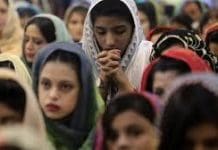By Martin Roth, BosNewsLife Senior Columnist

MELBOURNE, AUSTRALIA (BosNewsLife Columns)– One of the modern-day saints of the Middle East is Father Douglas Bazi, a Chaldean priest who endured nine days of captivity and torture after being kidnapped by the al-Qaida terror group. During my Skype interview with him last year, I was startled at how surprisingly cheerful and relaxed he appeared when recalling his harrowing experiences.
The priest is one of the heroes of a book I highly recommend. It’s “After Saturday Comes Sunday,” by Elizabeth Kendal. The sub-title sums up its message: “Understanding the Christian Crisis in the Middle East.”
Some of the book’s stories tell the traumatic experiences of individuals such as Father Bazi.
Kendal writes: “Bazi is fed up with Western elites who insist that all the Middle East needs is political and economic liberalization. He is furious that despite having no understanding or practical experience of Islam, they will insist that Islam is inherently peaceful, arrogantly believing they know Islam better than he does.”
“’We are in pain,’ the priest says. ‘I am angry because I know Islam well. In Baghdad they blew up my church. I drove by three bombings, and twice my car was destroyed. I got shot in my leg by an AK-47 – by Islam, and they kidnapped me for nine days.’”
DRIVING THEME
This is a driving theme of the book – that the West does not truly understand the tragedy that is the Middle East. And I can think of few writers better able to explain the history of the crisis to us than Kendal, one of the finest commentators writing today about Christian persecution.
I especially value the regular Religious Liberty Prayer Bulletin emails that she sends free to anyone who subscribes. In fact, she lives here in Australia in my city of Melbourne, (although we never met yet). She is Adjunct Research Fellow in the Centre for the Study of Islam and Other Faiths at the Melbourne School of Theology.
The book’s title is, says Kendal, “a popular Arabic war cry which never fails to make the blood of Middle Eastern Christians run cold….As sure as Saturday (the day of Jewish worship) is followed by Sunday (the day of Christian worship), first we’ll kill the Jews, then we’ll kill the Christians.”
And so much of the book recounts – often in unsparing detail – the horrific “Sundays” endured by Middle Eastern Christians over the past few years as their traditional homelands have come under waves of attacks from an enemy intent on genocide.
SPOILER ALERT
But – spoiler alert! – “After Saturday” can have another meaning. Think back to the crucifixion. On Saturday the disciples were in despair. Their Saviour had been executed. Their dreams were crushed. Yet on Sunday came the most joyous news ever heard by humankind: Christ Jesus had risen again.
And so it is today in the Middle East.
Amidst the genocide we see signs of hope. In her final chapter Kendal shows how God is at work right across the Middle East,
drawing people to Jesus in spectacular fashion. As persecution intensifies, it seems the number of believers grows.
This book isn’t always easy to read. The horrors it describes are real, and are happening today, to our Christian brothers and sisters.
Yet it is ultimately a book about God. And about the Christian Hope. Every Christian will feel inspired from reading it.
 (Martin Roth (www.authormartinroth.com), BosNewsLife’s Senior Columnist and Special Correspondent is a respected Australian journalist and former Tokyo-based foreign correspondent. He is the author of “Journey Out Of Nothing: My Buddhist Path to Christianity” and of the Brother Half Angel series of thrillers, which focus on the persecuted church. BosNewsLife Columns distributes opinionated columns and commentaries providing a fresh perspective on issues in the news. They do not necessarily reflect the opinion of BosNewsLife News Agency or its parent company.)
(Martin Roth (www.authormartinroth.com), BosNewsLife’s Senior Columnist and Special Correspondent is a respected Australian journalist and former Tokyo-based foreign correspondent. He is the author of “Journey Out Of Nothing: My Buddhist Path to Christianity” and of the Brother Half Angel series of thrillers, which focus on the persecuted church. BosNewsLife Columns distributes opinionated columns and commentaries providing a fresh perspective on issues in the news. They do not necessarily reflect the opinion of BosNewsLife News Agency or its parent company.)








